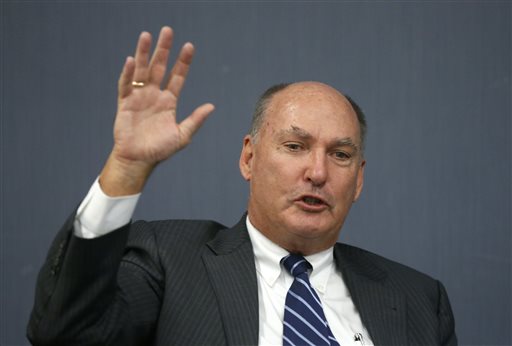(AP) Delany says power conferences hope to stay in DI
By NANCY ARMOUR
AP National Writer
ROSEMONT, Ill.
Giving the power conferences more autonomy in a restructured NCAA could help address the “existential threats” that plague college sports at their highest level, Big Ten commissioner Jim Delany said.
The five conferences _ the Big Ten, Big 12, Pac-12, SEC and ACC _ don’t want to leave the NCAA or even form their own division, Delany said Thursday. But they need the power to make decisions that directly affect the financial and educational well-being of their athletes.
“We’re not talking about pay for play,” Delany said, speaking at the Big Ten’s basketball media day. “We are talking about the cost of education, kind of scholarship. We’re talking about a long-term educational commitment, perhaps beyond the time they’re student-athletes. We’re talking about managing the at-risk student. We’re talking about the time demands.
“We have to be able to do what we need to do in order to address those issues, and we need the authority to do it.”
The NCAA has been battered by a series of scandals over the last year, most centering around money. The long and messy investigation at Miami, sparked by a booster, finally wrapped up last week. Heisman Trophy winner Johnny Manziel was suspended for the first half of Texas A&M’s season opener for an “inadvertent” violation of NCAA rules involving signing autographs. A Yahoo report last month said a runner for agents provided improper benefits to football players at Alabama, Tennessee and Mississippi State.
And despite support from the NCAA’s board, the full membership has twice rejected a rules change that would have allowed schools to give athletes money for expenses not covered by their scholarships _ clothes, travel, meals out with their friends. Houston Texans running back Arian Foster said in a documentary that he accepted money his senior year at Tennessee, in part to pay rent and buy food.
“There are a variety of threats. We don’t have control over a lot of it,” Delany said. “But what you do have control over you should try to grapple with, and I think restructuring gives us the chance to manage the policies that we still have some control over.”
NCAA leaders appear to agree. After getting input on restructuring from nine groups, including the conference commissioners, the NCAA board said Wednesday that while it believes presidents should still be in charge, some schools should have greater leeway in making decisions affecting their athletes, particularly when it comes to finances and scholarships. The board also said it should focus more on overall strategy and vision and less on day-to-day operational activities.
“I thought it was a good step,” Delany said.
A steering committee, led by NCAA board chair Nathan Hatch, will now craft proposals for restructuring. Those will be presented at the NCAA convention in January, and Hatch hopes a final plan will be ready by the spring.
“We don’t want to draw lines and put certain people in and certain people out. We don’t want anybody else’s money. We don’t want to change one of the great events in the world,” Delany said, referring to the NCAA basketball tournament.
“But right now, the level playing field philosophy is so powerful and the differences among the 351 schools and 32 conferences is something we can’t really deal with,” Delany said. “We’re going to have to get the change.”
The power conferences are looking for autonomy in some areas, a super majority in others and a simple majority in still others. And if other conferences _ say, the American Athletic Conference or Mountain West_ are of a similar mindset, the decisions could cover them, too.
“I think the changes would be, in many areas, permissive. So If you have the resources, do it,” Delany said
Asked how different that would make Division I look, Delany said he doubted anyone would notice. The makeup of the championship tournaments, including the NCAA basketball tournament, would remain the same. Schools still would be held to the same academic standards. The lengths of seasons would remain uniform, as would rules for recruiting.
“It would appear, from a competitive perspective and branding perspective, identical to what it is,” Delany said. “What you would have is the five conferences have more authority to address the things that they can, consistent with the resources we have.
“Things are stuck in 1975 for the student-athlete. We’d like to get to the 21st century,” he added. “And we think connecting the structuring to the needs of the 21st century, consistent with the resources we have, is the right thing to do.”

COMMENTS
Please let us know if you're having issues with commenting.